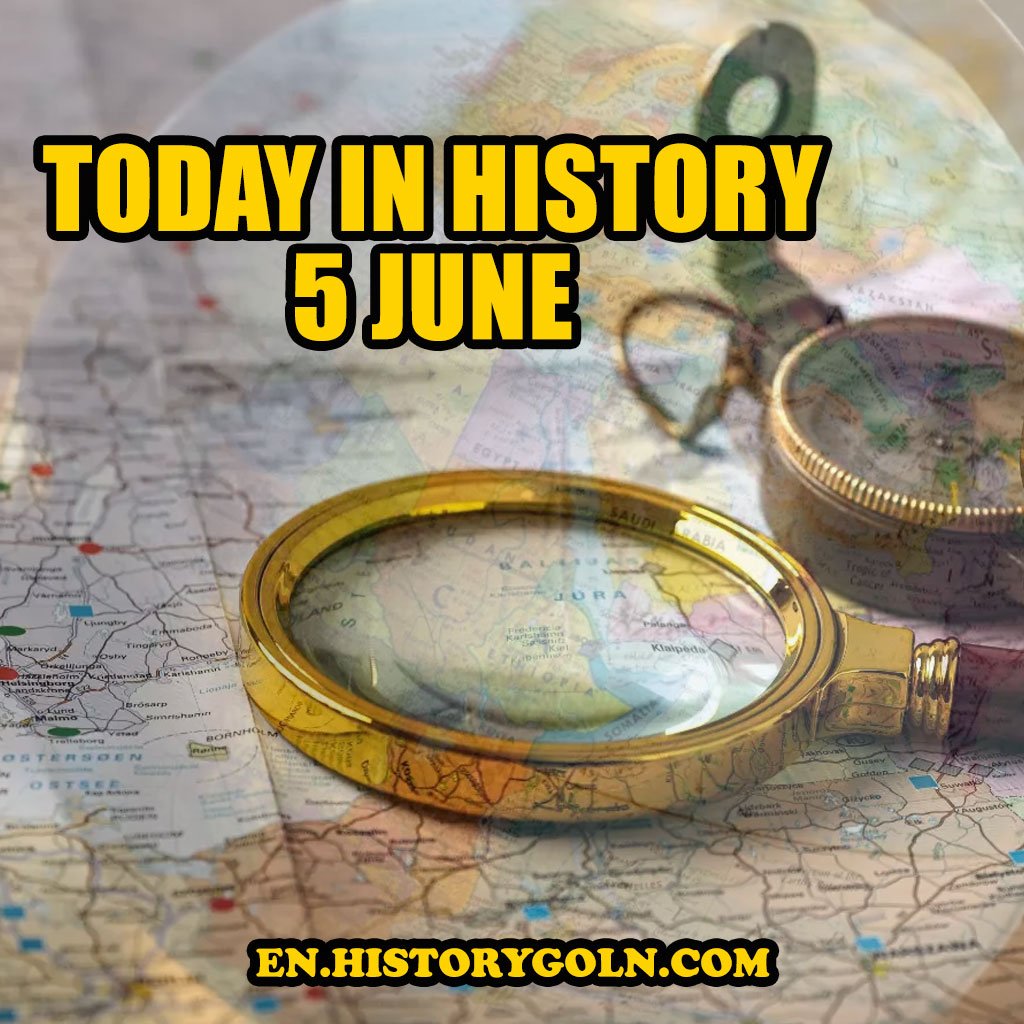Throughout history, certain dates have become indelibly inked into the collective memory of humanity. June 5 is one such day, teeming with events that range from groundbreaking discoveries to transformative social and political movements. Let’s venture through the annals of history to explore the many significant occurrences that have shaped our world on this day.
Today in History: 5 June

1257 – Kraków Receives City Rights: Situated in modern-day Poland, the city of Kraków was granted city rights based on the Magdeburg Law. This set of German town laws served as the foundation for Kraków’s urban development, allowing it to become a prominent cultural and academic hub in Europe.
1798 – The Battle of New Ross: Amid the Irish Rebellion of 1798, the Battle of New Ross was fought between the United Irishmen and British Crown forces. Though the rebels experienced initial success, the British ultimately recaptured the town of New Ross, resulting in substantial casualties.
1829 – Sir Robert Peel Introduces the Metropolitan Police Act: This act, introduced in the UK Parliament, led to the formation of the Metropolitan Police Force for London, marking the beginning of formalized police services in England. Consequently, members of this force were dubbed “bobbies” or “peelers” in honour of Peel.
1883 – The First Orient Express Departs: The inaugural journey of the Orient Express, an iconic long-distance passenger train, began. Starting from Paris, it travelled to Giurgiu in Romania via Munich and Vienna. The Orient Express became synonymous with luxury travel, playing a starring role in numerous works of fiction.
1916 – The Arab Revolt Against the Ottoman Empire: Sherif Hussein bin Ali ignited the Arab Revolt against the Ottoman Empire during World War I. Supported by Britain and France, the revolt aimed to create a single unified Arab state, spanning from Aleppo in Syria to Aden in Yemen.
1933 – The U.S. Abandoned the Gold Standard: In an attempt to combat the Great Depression, the U.S. officially went off the gold standard, a system wherein the value of currency was directly tied to gold reserves. This move gave the government more flexibility in its monetary policy.
1947 – Marshall Plan Outlined: U.S. Secretary of State George C. Marshall delivered a speech at Harvard University, outlining what would become known as the Marshall Plan. This European Recovery Program aimed to help rebuild war-torn Europe, countering the spread of communism and solidifying U.S. influence in the region.
1963 – The Equal Pay Act Becomes Law in the U.S.: Signed into law by President John F. Kennedy, the Equal Pay Act aimed to abolish wage disparity based on sex. While the fight for pay equality continues, this act was a pivotal step towards addressing gender wage gaps in the U.S.
1967 – The Six-Day War Begins: A fast-paced conflict erupted between Israel and its neighbouring states of Egypt, Jordan, and Syria. In just six days, Israel captured the Gaza Strip, the Sinai Peninsula, the West Bank, East Jerusalem, and the Golan Heights, profoundly reshaping the geopolitical landscape of the Middle East.
1968 – Robert F. Kennedy Assassinated: Just moments after delivering a speech in Los Angeles, Senator Robert F. Kennedy, a Democratic presidential candidate and brother to the late President John F. Kennedy, was shot and fatally wounded. His death shocked the nation and the world, marking a tragic chapter in the tumultuous 1960s.
1975 – The Suez Canal Reopens: After being closed for eight years following the Six-Day War, the Suez Canal, a crucial waterway connecting the Mediterranean and the Red Seas, was reopened for international navigation.
1981 – The AIDS Epidemic is Formally Recognized: The U.S. Centers for Disease Control and Prevention published a report detailing cases of a rare lung infection found in five previously healthy gay men in Los Angeles. This marked the first official reporting of what would later be known as the AIDS epidemic.
2001 – Tropical Storm Allison Hits: The U.S. Gulf Coast, particularly Texas, experienced severe flooding when Tropical Storm Allison made landfall. The storm, considered one of the deadliest and costliest in U.S. history, led to significant changes in storm preparedness and response measures.
In Conclusion
The events of 5 June, spanning diverse geographical regions and eras, offer a snapshot of our complex, intertwined global history. From wars that reshaped continents to social movements challenging the status quo, from scientific advancements propelling us into new eras to natural disasters reminding us of our vulnerability, June 5 stands as a testament to the ever-evolving narrative of humanity. As we reflect on these moments, we gain not only knowledge and understanding but also a renewed appreciation for the resilience and adaptability of the human spirit. Looking back at ‘today in history’ reminds us of the foundations upon which our present is built and offers insights into the potential paths our future might take.
